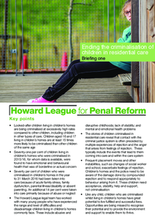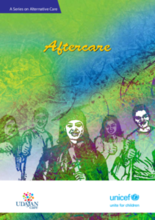Displaying 751 - 760 of 962
This article examines the legal inadequacies of reinstatement statutes in the US which "often punish parents who opposed the termination of their parental rights and reward those who voluntarily signed relinquishments."
This is the first in a series of briefings to be published alongside a programme of research and campaign work to end the criminalisation of children living in residential care. The project builds on from research published in March 2016, which found that children living in children’s homes in the UK were being criminalised at much higher rates than other children, including those in other types of care.
This booklet on aftercare is part of a Series on Alternative Care covering the latest legal and policy framework on Alternative Care in India, which has been presented in an easy-to-understand style so that they can be used as an effective reference material by all stakeholders.
This report documents the life experiences of care leavers in Australia.
This video is presented by Better Care Network and UNICEF. It features interviews with experts, including members of the Kenya Care Leavers Association explaining some of the negative impacts of institutionalization and highlighting their efforts to support young people who are transitioning out of care.
This qualitative study explored adolescent girls’ perspectives and programme needs as they transition from two institutions in Highfield, Harare, Zimbabwe.
This study captures the lived experiences of twenty-four young Indian girls who have left care in the past four years. It addresses their journey of moving out of care at two levels — their preparation to leave care and their present experience.
Employing focus groups and participant-observation, this exploratory study examined areas of personal development, knowledge, and skills of young women who were formally in residential care in the Philippines to determine success factors for young women with traumatic histories.
This chapter of Young People Transitioning from Out-of-Home Care reviews the state of South African youth, particularly regarding poverty, employment and education, providing the social context within which to consider those leaving care.
This article examines the adjustments for policy, research and intervention in non-Western developing contexts. Particular attention is focused on the country of Vietnam, a Southeast Asian country, with a communist government and a rapidly developing economy.





